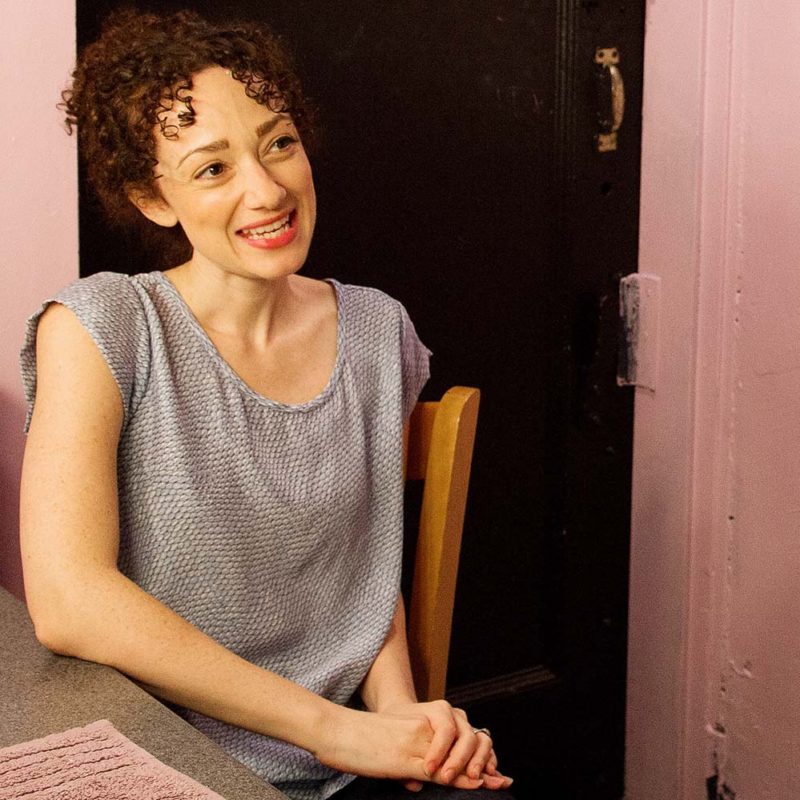An Interview with Megan McGinnis
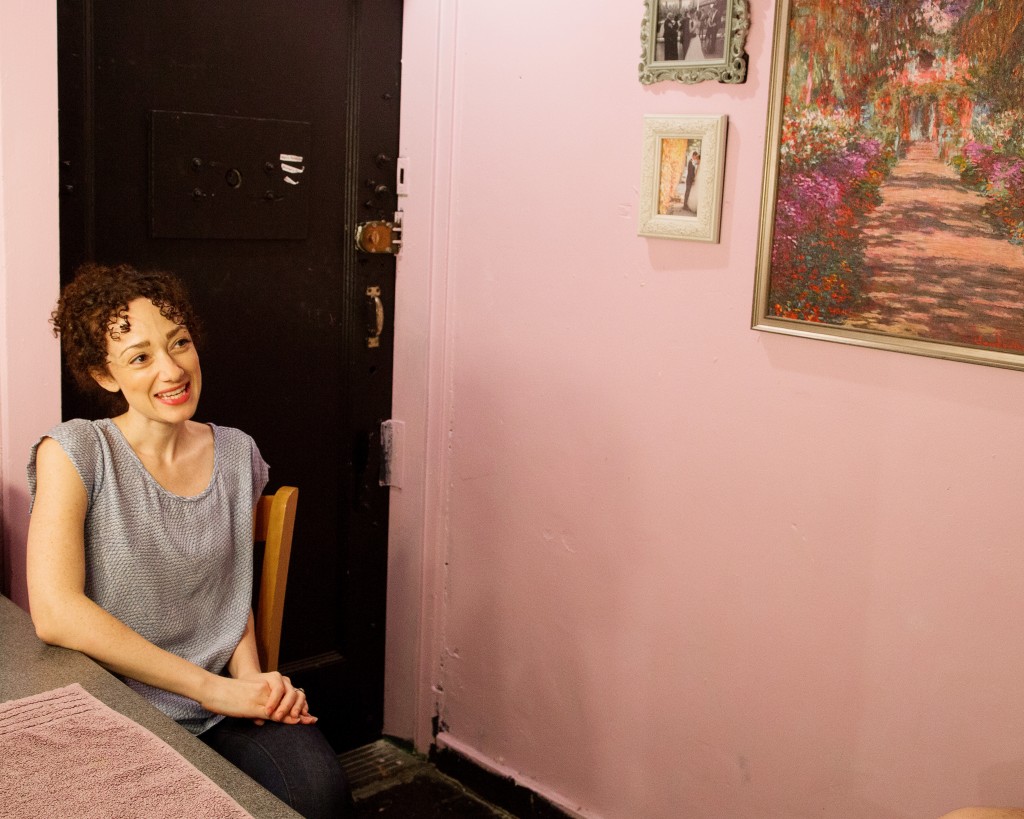
Written by Victoria Myers
Photography by Emma Pratte
October 29th, 2015
Megan McGinnis is currently starring in the new musical Daddy Long Legs, which is based on a little-known novel of the same name and chronicles the college education of a woman, Jerusha, in the early 20th century. The two-person musical is finally in New York after being performed all over the country, and we were intrigued to talk to Megan about the subject matter of the show and its unusual development process. Megan appeared in fourteen out of town productions of the show and earned a LA Ovation Award and a Chicago Jeff Award nomination on the way. She’s previously appeared on Broadway in Les Misérables, Little Women, Beauty and the Beast, and many more. We met Megan in her dressing room before a performance and spoke to her about Daddy Long Legs, development of new work, how she got started in theatre, and much more.
(i.) Present
During almost all of Daddy Long Legs, since it’s made up of letters, you talk to the other character through the audience.
One of the first things John Caird, our director, talked to me about, is how everyone in the audience represents Daddy Long Legs. So I completely feel like I’m talking to Daddy Long Legs when I look at everybody’s face. What’s so great is that it changes every night since the audience is different every night, so they keep me on my toes.
Was that something you had to adjust to? I know some actors hate having to talk to the audience.
I probably used to hate it too. When people have talked to me about auditioning for the show—there are regional productions that I didn’t do—I tell them, even at the audition, look everyone in the eye at the response of, “That’s awkward.” And I explain that it may feel that way at the beginning, but it becomes so second nature. I love it now. There’s something about that connection that feels so intimate and important in this show, especially since there aren’t scenes in the same way that there are in pieces that aren’t about letters. I think it allows the audience to feel like it’s more active.
Since there aren’t scenes in a traditional sense, did you have to think differently about the arc of the character?
No, actually. The arc of the character seemed so easy to me. The book is so beautiful and so straightforward. It’s four years of her life. Four years of letters. And she’s so descriptive and so imaginative, I got everything I needed for her arc from the book, and Paul [Gordon] and John [Caird]’s adaptation is so truthful and I think is taken so directly from the book that I never had a problem with the arc. The letters seemed very active to me, very much interpretive of her life.
(ii.) Modern Audiences
When doing a period piece for a modern audience, how do you find the balance between being true to the material but still making sure it’s not going to make a modern audience squirm?
I remember Kelli O’Hara talking about this with The King and I and, “Oh we have to look at this scene a little differently since this audience isn’t going to take to his misogyny the same way.” I don’t think we’ve taken a different approach. Her story is absolutely what her story is. She’s absolutely a feminist. She talks about women’s rights in 1910. The ability to vote. Obviously, a woman’s right to an education. She’s a woman of the world. And in no way a victim, and in no way ending up in anything that’s maybe typical for a woman of that time. However, she is manipulated by a man, and she does forgive him in the end. It’s been pointed out that she forgives him somewhat easily. We’ve taken a look at that part of the show repeatedly. I’ve been part of this show since 2009. The end of the show has always been in flux because of that. We knew it was a 2015 audience and they’re going to be looking at Jervis’ apology differently and Jerusha’s acceptance of that differently, but we aren’t going to change the story. In the book it’s almost laughable how quickly she forgives him, but the book was written in 1910. Because they’re all letters, there’s no scene at the end where she meets him. Her second to last letter is basically talking about how Jervis proposed and how she said no and why she said no, and then her last letter is, “And I went to meet Daddy Long Legs and I can’t believe it was you all along.” That was it. So we’ve absolutely expanded on that and made it a discussion and a fight and a realization, and I felt comfortable with it in the end, as far as this is the time and this is how we’re going to play it.
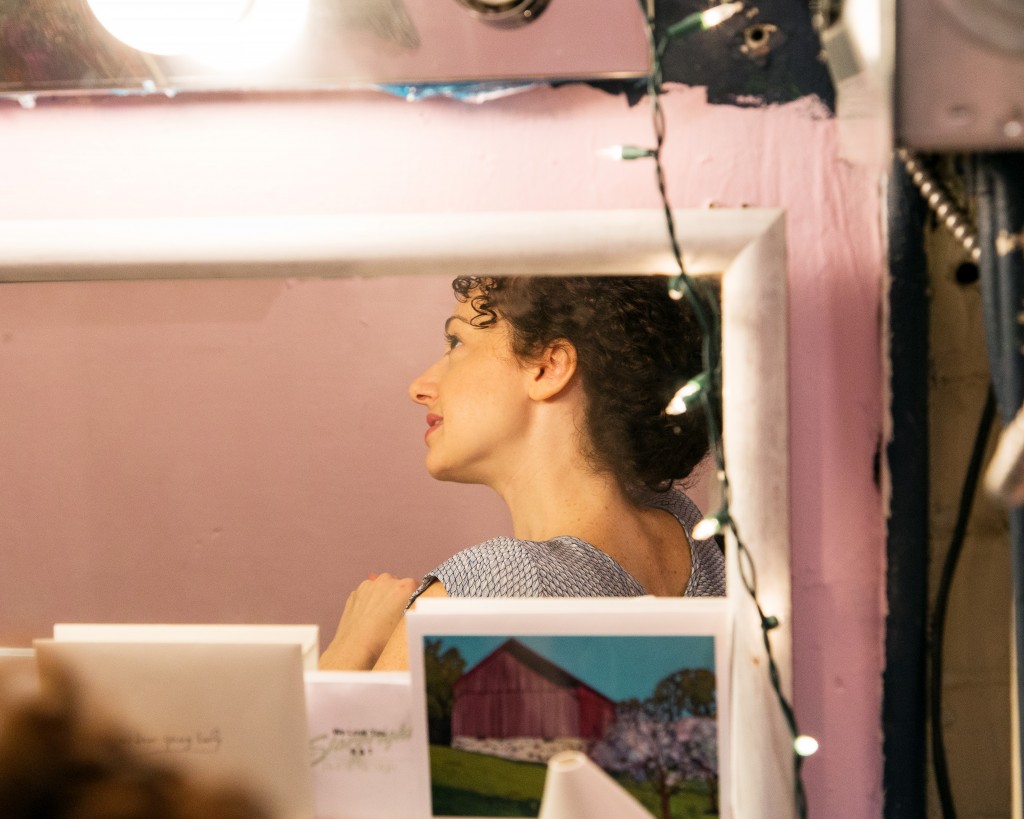
(iii.) Another Era
You were an English major in college, right? Did that affect your connection to this show?
I was obsessed with British literature mostly, and I was a bit of a snob when I was in college and thought all modern fiction wasn’t that good. I don’t know why it took me so long to realize what a terrible thing that is to say. I seem very drawn to characters who are well read. I don’t know if that has to do with being an English major. I certainly love those characters most of all and it’s been incredibly easy to connect to someone like Jerusha, having gone through four years of college studying literature. But what initially drew me to this project was hearing a demo that Paul Gordon gave me. Jane Patterson sang on the demo and I was obsessed with listening to her sing the songs and how gorgeous the songs were. Then I read the script and I was like, “Oh, I really want to do this.” And I was thinking recently about how I seem to have been a part of a lot of musicals about very strong women. I may not have played the strong woman, but they’ve been about strong women. My first show was Anne Frank, Lucille’s journey in Parade, Thoroughly Modern Millie, Little Women. I think that’s kind of interesting.
It’s interesting that none of those are contemporary.
Well, I don’t tend to get cast in contemporary stories.
I saw that you had mentioned that in a few interviews. And it occurs to me that there’s no male equivalent of, “She doesn’t look contemporary.”
That’s a very good point.
It’s interesting that it’s a very female thing to be like, “She looks like she’s from another era.”
I always blame it on my hair. The curls. And maybe just being so pale. It’s rare that I’m seen for projects that take place after 1975.
The hair thing and ethnicity is kind of a whole separate issue, but it’s interesting how we view certain attributes as being okay for a period piece but then view them differently in a contemporary setting.
Recently I did a couple of readings that Leigh Silverman directed, and one of them is contemporary, and when I got the offer for the first reading I was so excited that Leigh would consider me for something that other people hadn’t.
She’s great.
I love her so much.
(iv.) Music
What is your relationship like with music? We’ve talked to a lot of composers—actually no, we’ve talked to like two, but we talk to Jeanine Tesori a lot.
I love Jeanine too.
But something that comes up with composers and musical people is whether they visualize music—like the color thing—or if they relate emotionally or based on the story. What is your relationship like with music?
Emotional. That’s absolutely it. It’s how it makes me feel. I wish I saw colors. The lyric, of course, and how I respond to the lyric, but then how the actual music makes me feel.
(v.) New Musicals
Let’s talk about the development of new musicals. It seems like there’s much more talk about new play development even though musicals are harder to develop.
And they’re more expensive. There are usually more people. I just want more resources for all new works, I just don’t know how we get them.
As an actor, is there anything you see where you’re like, “This process would be so improved if people just did this…”
There are wonderful places where we can workshop new works, but I wish there were more. I also wish they were more isolated. It’s almost as if the second the word gets out on a project, the word is done. Whatever that one person says about the work at that point in its development, that’s how it will then be described. I think that’s really unfair. I think so many shows need and deserve years. I do wish there was more privacy.
Well, now with the internet…
That’s the thing. And with social media. And now everything is on YouTube, and as much as I enjoy getting the word out, then I think this is the way it will always be perceived—by this iPhone camera that was snuck into a theatre. That’s not how it was designed.
It will be interesting to see, and I don’t think we will for a few years, how it affects people’s ideas of what a revival can be since there’s so much media. Whereas before you just had the cast album.
That will be interesting. When I was doing Little Women I was obsessed with the chat boards. Obsessed. And reviews too. I’d read every review. Not just about me. Everything. And after reading every single review, after we opened in January, I stopped. I stopped cold turkey. And I haven’t read anything since.
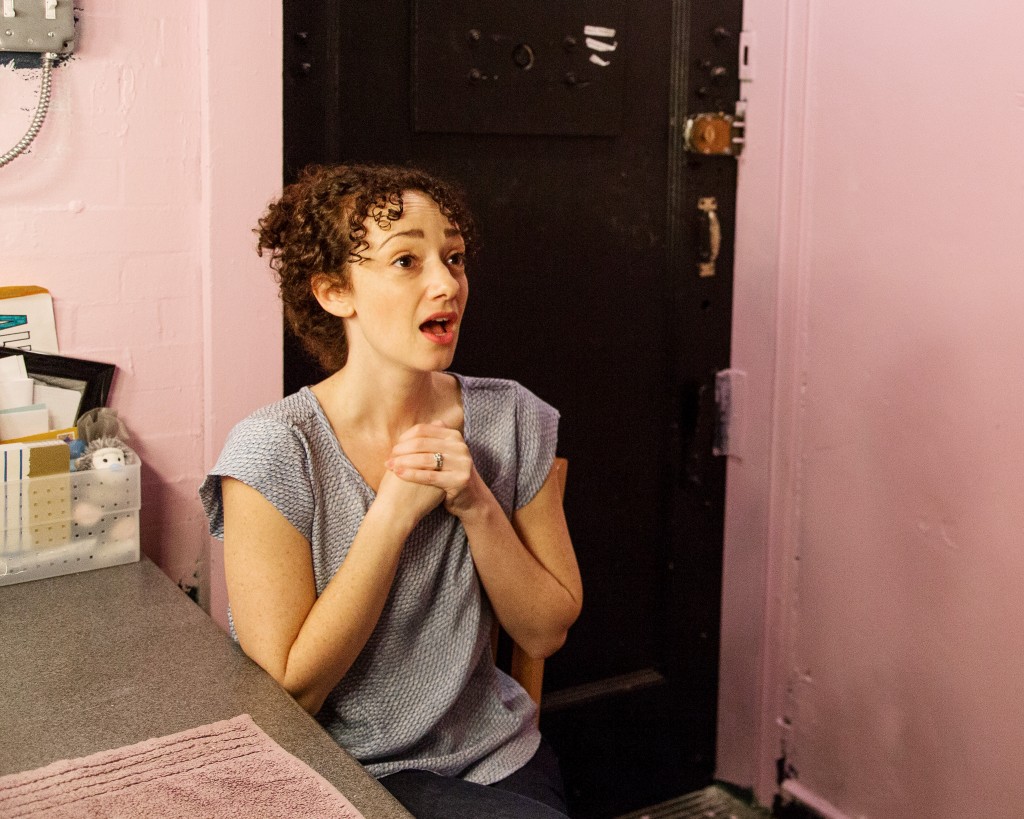
(vi.) Out of Town
Daddy Long Legs had a few out of town try-outs and that’s unusual.
Fourteen. One of our producers said, “It’s going to be like a grass roots campaign of putting it out there and then bringing it to New York instead of starting in New York.”
Yeah, that is a completely different model.
But I also think because things are so expensive that we are having to find different ways to bring a show into New York, and I think this was a really smart way of doing it. I don’t even want to say their intention was always to bring it to New York. We just kept developing it because we loved it.
The other thing that struck me as unusual is that it’s a two-person show and it seems like people feel like musicals need bigness.
I know writers who say they have to make things really small, since they feel they have to be economical since it takes so much money to put a show up.
Well, it’s like how do you make it economical, but also if you see Broadway as the only place for musicals, it can be limiting in terms of what a musical can be.
We got that a lot too when we were out of town. People would say, “Do you want to go to Broadway?” and I’d say, “I want to go to where the show takes me,” but then people would say it’s not a Broadway musical, there’s only two of you, and only one set. Well, I didn’t know there were rules. I understand. I hope that’s not true, in general.
It’s really limited creatively.
We could talk about all the problems, but there are so many times where I look and see all the different things on Broadway and think there’s a place for everyone.
(vii.) Past
What was the first piece of storytelling that had a major impact on you?
Well, first I’m going to tell you what my mom tells me, which is that she took me to see a production of The Mikado when I was three. She thought it was going to be a full production, but it wasn’t, and she thought I’d be bored, but I sat on her lap riveted through the whole thing. I, of course, do not remember this at all. She said that was when she identified that maybe I loved music and theatre. My first memory is The Wizard of Oz. I can’t tell you how many times I saw that movie as a child. Sometimes I’d watch it three times a day. I was obsessed with Judy Garland. That’s probably my first memory. Tied closely, I’m sure, with Annie the movie.
And you went to Columbia and studied English. How did you get back to theatre?
So when I was five, my parents tell me that they were concerned that I was a little introverted, so my mom thought, “She loves music, so let’s put her in theatre.” She took me to auditions for a local college production of The King and I and I was hired as one of the King’s children. Yep. After a couple of weeks of rehearsal I told my mother I was incredibly bored and wanted to quit. She said, “You never have to do this again but you have to finish this production because we gave our word.” By the end of it I was sold. I continued doing community theatre. I grew up in Los Angeles, so there were lots of TV and commercial and film possibilities, so I got an agent and did some stuff on TV. My intention from probably 13 on was, I’m going to New York and I want to be on Broadway. That is all I wanted. My parents are both university professors. They are education all the way. They said, “You can do whatever you want but we want you to go to college, and we’d prefer if you majored in something not to do with theatre because we’ve been giving you all of this time and money to find your way in theatre, and now we want to see if you want to try something else.” I thought about it and the summer before my senior year I applied to two summer programs—one at Tisch at NYU, and a creative writing program at Columbia. I got into both and I picked NYU, and I came to New York for four weeks and loved every minute of it, but at the end I decided I did not want to go to college for theatre. I applied to eight different schools and seven of them were for programs not in the arts. When I got into Columbia, it seemed like the perfect fit since I could go to school for something else but still continue to peruse my dream. At the time I’d signed with a manager who was bi-costal and she was like, “Come to New York, get your degree, and I’ll still send you out on auditions.” Then I got my first two Broadway shows when I was still in school. My parents pushed me to do what I wanted, which was the greatest gift. I also went to an all girls college prep school which I think gave me a great deal of confidence, and I was eager to pursue everything in the world they’d been telling me about. I felt like I’d be able to explore theatre better if I had knowledge of other things as well.
Have you found that to be true?
Absolutely. Getting my degree was the hardest thing I’ve ever done and one of the best. And I’m proud of it. It took me a long time. I took a year and a half off because I got a tour and then I didn’t feel ready to go back, then I took another job, and I didn’t think I was going to go back. But then my parents—it’s very rare that they lay down the law but when they do I understand that it’s important—they said, it’s important for us that you finish. I’m so glad they said that.
When is the first moment you felt like a grown up?
Because I was so shy, my parents forced me to do adult things even when I didn’t want to. As simple as, if I wanted ice cream I had to call Baskin Robins and ask them how late they were open. Or signing in at auditions. But this just came back to me. I was seventeen when I moved to New York, and I was going out on auditions and I didn’t know the city that well and I was on my own. I missed a commercial audition. I got there late because I got lost. I remember finding a payphone and calling my manager crying because I was so upset that I had let myself down, let her down—I mean it was a commercial, if I knew what I know now… But I remember thinking, “I have to figure it all out, all by myself.”
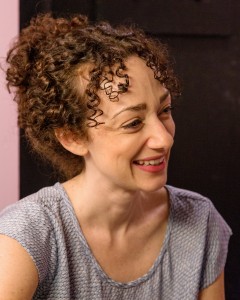
(viii.) The Industry
Has there been anything that’s been surprising to you about this profession?
Not surprising in that I couldn’t have guessed it, but things I didn’t think of. Like what aging is like in show business. As I’ve gotten older, it’s become clear to me that that’s a thing. And it’s scary. I never thought about what having a family in show business would be like. So two big things that surprised me, I just never thought about the future in that way.
Both topics come up in interviews a lot. Especially the family thing.
Yeah, it’s big. Up until a year ago I thought, surely maternity leave is a thing that exists, and I looked up a couple of contracts in the rule book and I was surprised. It does exist, but not in the way I thought. That’s not just our business, but America. But in our business, women who carry a child and need those nine months and won’t be able to work a great deal of that time, it’s an issue.
Megan Sikora brought up that Equity had nothing to help with maternity leave or childcare.
Yeah, I was really surprised. I don’t know what we can do about it.
The aging thing comes up a lot too. Especially when it comes to casting, and maybe especially in musicals.
I think men deal with it too. I just think maybe the transition might be a little bit easier. My husband, who is also an actor, has fears about it too. I think in musicals there does seem to be a very simple division of ingénue and mother of the ingénue.
(ix.) Questions
What’s it like working at a young age and developing as a person at the same time? How do you think that affected you?
I think a lot of that stuff happens without you even knowing it. In a way, I still feel like I’m playing parts that are more youthful than I am, so I think it will be interesting as I start playing older parts. As far as working early in my career, it affected me most in that I was so young when I first started working on Broadway that I was so eager to learn everything. I love learning. Even to this day our associate director will come and I’ll beg for notes. I love notes. I love watching people. I think that’s the best way to learn.
Some of the other women we’ve talked to have mentioned how they feel like their questions are perceived differently. They’re taken as weakness. Have you found that?
I don’t feel that my questions are taken that way, but I also don’t think I stop to consider it. I think that has a lot to do with how I was raised. When I was entering junior high, my parents gave me the choice of going to a co-ed school or an all-girl’s school. I went and visited both schools, and even at that young age, I could see the difference in the environment at the all-girl’s school. I loved it. I loved how easy it seemed to be a girl. There wasn’t a fight for attention, it was clear that a woman’s voice mattered and counted. It was an incredible environment to grow in for those six years. I know many women may not need that, but I think I did. And I think it taught me well.
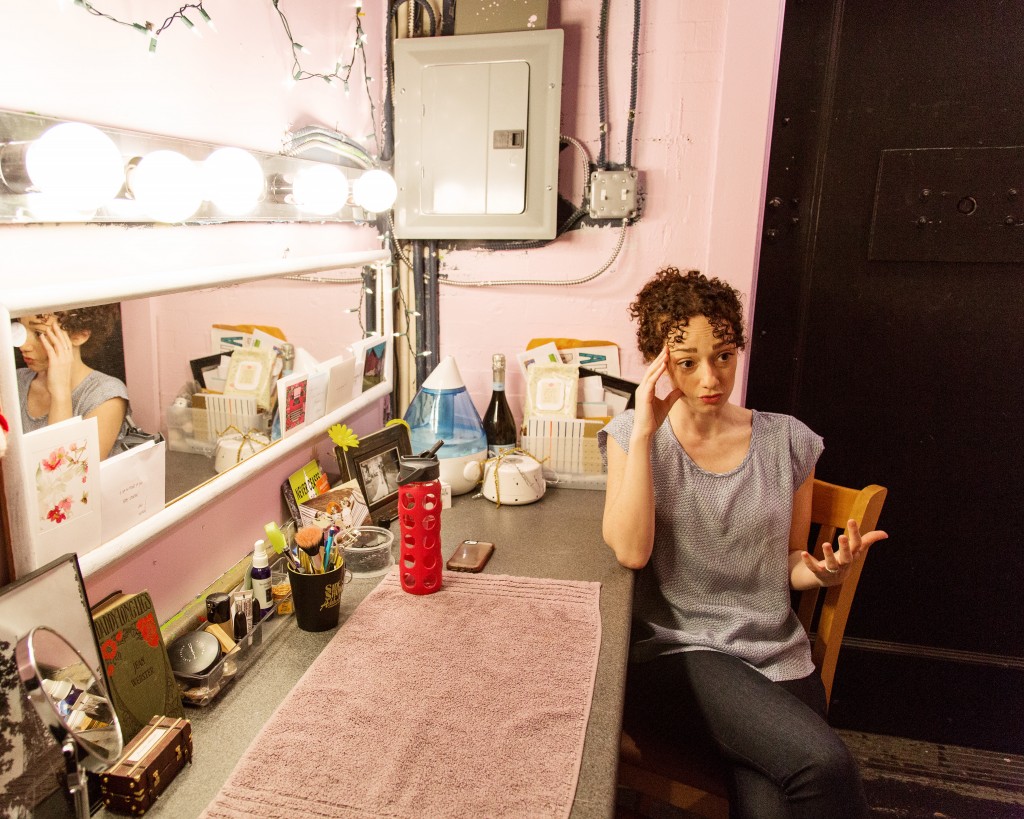
(x.) Future
What can people do to improve gender parity in theatre?
I realized today that I worked more regionally in the last five years than I have in my whole career and I realized there was only one female artistic director in all of those theatres. I think that’s interesting. I think it would be a very good thing to get more female voices in regional theatre.
You can follow Megan on Twitter: @menguinmcg and Instagram: @menguinmcg.

